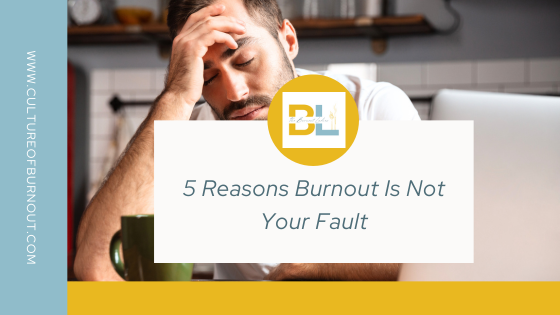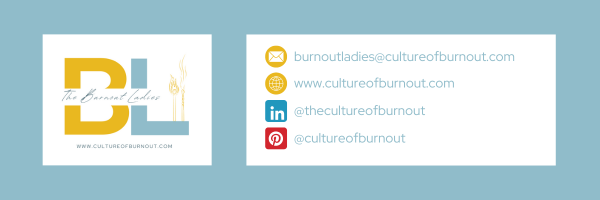
Everyone loves a list, right? Our brains appreciate organized ways to think about tasks and ideas. In that spirit, we offer to you our list of reasons why burnout is not your fault.
- America as a culture thinks busy = important
How many times has someone asked you how you are and you’ve responded, “oh, so busy, but good!” Or maybe, “Oh, so incredibly busy. I can’t believe how much I have on my plate!” It’s probably said with a self-effacing shake of your head. We know we’ve done it. And when we told people that we were busy, what we hoped they’d hear was that we were important.
We were so important that people needed our time, our attention, our resources.
The thing is, we are important. We are important to people who love us, who work with us, who know us. But being busy with stuff and things and tasks is not why we’re important to those people. So maybe we should reconsider if it makes us important to anyone else.
- Capitalism does not care about you
We hate to be the bearer of bad news, but the economic system of capitalism that America operates with does not care about individual people. It cares about resource accumulation and production. If an individual person needs to sacrifice their physical and mental health, their family life, their sense of wellbeing for that accumulation or production, capitalism doesn’t care. There are no bumpers on the bowling lane, unless we put them there.
- We’ve decided work is a moral value
The foundational culture of the United States traces back to the Puritans (LINK VIDEO?), who believed that you were only a good person if you worked really hard. Established in the 1600s, no one has ever questioned this assumption, and instead, we built an entire country on it. If you’ve ever heard of someone taking government assistance and assumed they were lazy – that’s this belief.
It’s exhausting to live up to. It means that when we are tired or overwhelmed, there’s a voice in the back of our heads telling us that we’re not worth anything if we don’t keep working, or that we have to work hard to be good, or that if we stop working we’re lazy. We believe we have to earn rest. That’s nonsense.
- The “American Dream” isn’t possible without burnout
The idyllic American Dream was never really possible for everyone, the way the advertisements made it seem. And for those for whom it is possible, it’s only that way for two reasons – your family had wealth to begin with, or you worked extremely hard. And as we covered above, the way America talks about hard work means that it’s at least a stepping stone to burnout and at worse, the root cause of it.
- The reality of unpaid labor
When people talk about burnout, they usually talk about burnout at work. The problem is that most of us (and especially women) take on huge amounts of work outside of a paid job. This unpaid labor is actually a major contributing factor to burnout. It comes with no time boundaries, is never ending, doesn’t feel controllable, and often feels impossible to delegate. When you’re thinking of your own sources of exhaustion, don’t forget to be honest with yourself. No matter how much you love your kids, or your parents, or your volunteer job – they’re allowed to be exhausting and they may be contributing to your burnout.
There you have it – 5 reasons why burnout is not your fault. It isn’t about choices you’ve made, but most likely it’s about choices made for you. What should you do about it then? Great question. Our book answers that with a clear framework you can use immediately. Buy your copy HERE.



